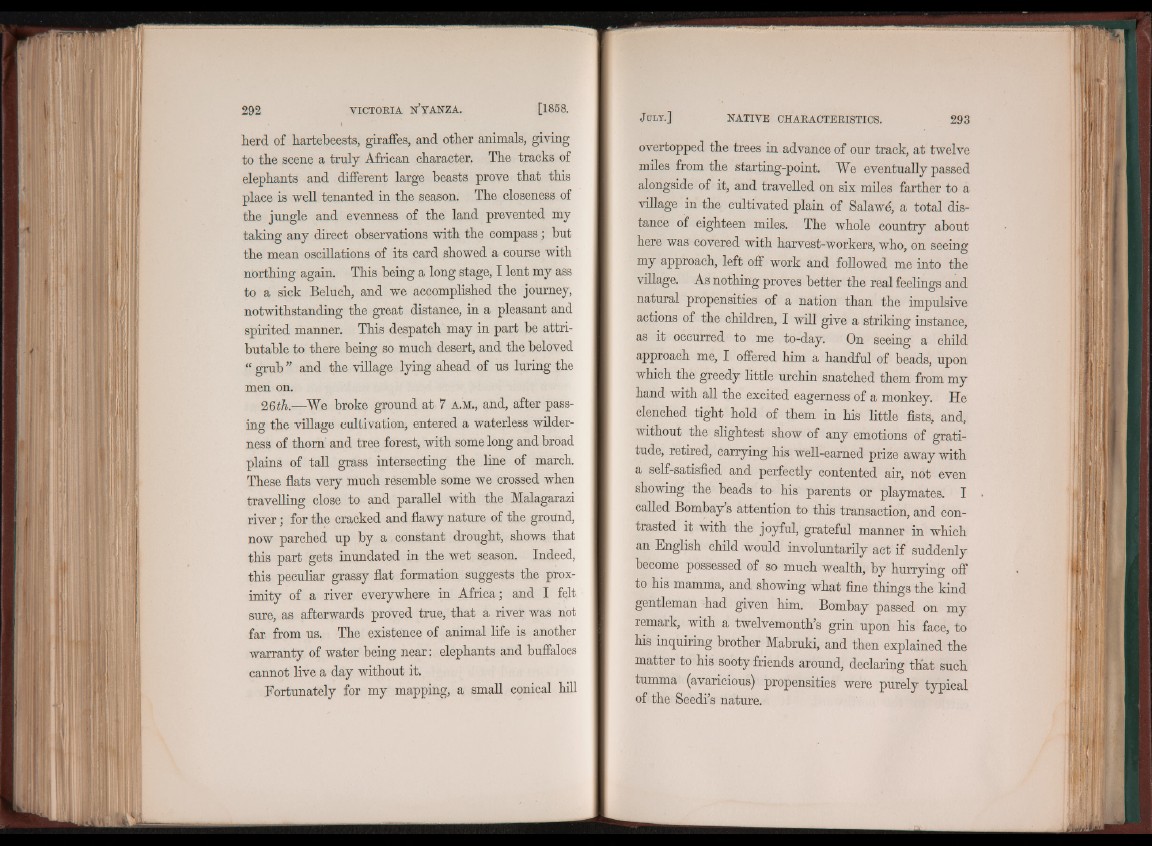
herd of hartebeests, giraffes, and other animals, giving
to the scene a truly African character. The tracks of
elephants and different large beasts prove that this
place is well tenanted in the season. The closeness of
the jungle and evenness of the land prevented my
taking any direct observations with the compass; but
the mean oscillations of its card showed a course with
northing again. This being a long stage, I lent my ass
to a sick Beluch, and we accomplished the journey,
notwithstanding the great distance, in a pleasant and
spirited manner. This despatch may in part be attributable
to there being so much desert, and the beloved
“ grub ” and the village lying ahead of us luring the
men on.
26 th.— We broke ground at 7 A.M., and, after passing
the village cultivation, entered a waterless wilderness
of thorn and tree forest, with some long and broad
plains of tall grass intersecting the line of march.
These flats very much resemble some we crossed when
travelling close to and parallel with the Malagarazi
river; for the cracked and flawy nature of the ground,
now parched up by a constant drought, shows that
this part gets inundated in the wet season. Indeed,
this peculiar grassy flat formation suggests the proximity
of a river everywhere in Africa; and I felt
sure, as afterwards proved true, that a river was not
far from us. The existence of animal life is another
warranty of water being near: elephants and buffaloes
cannot live a day without it.
Fortunately for my mapping, a small conical hill
overtopped the trees in advance of our track, at twelve
miles from the starting-point. We eventually passed
alongside of it, and travelled on six miles farther to a
village in the cultivated plain of Salawd, a total distance
of eighteen miles. The whole country about
here was covered with harvest-workers, who, on seeing
my approach, left off work and followed me into the
village. As nothing proves better the real feelings and
natural propensities of a nation than the impulsive
actions of the children, I will give a striking instance,
as it occurred to me to-day. On seeing a child
approach me, I offered him a handful of beads, upon
which the greedy little urchin snatched them from m y
hand with all the excited eagerness of a monkey. He
clenched tight hold of them in his little fists, and,
without the slightest show of any emotions of gratitude,
retired, carrying his well-earned prize away with
a self-satisfied and perfectly contented air, not even
showing the beads to his parents or playmates. I
called Bombay*s attention to this transaction, and contrasted
it with the joyful, grateful manner in which
an English child would involuntarily act if suddenly
become possessed of so much wealth, by hurrying off
to his mamma, and showing what fine things the kind
gentleman had given him. Bombay passed on my
remark, with a twelvemonth’s grin upon his face, to
his inquiring brother Mabruki, and then explained the
matter to his sooty friends around, declaring that such
tumma (avaricious) propensities were purely typical
of the Seedi’s nature.